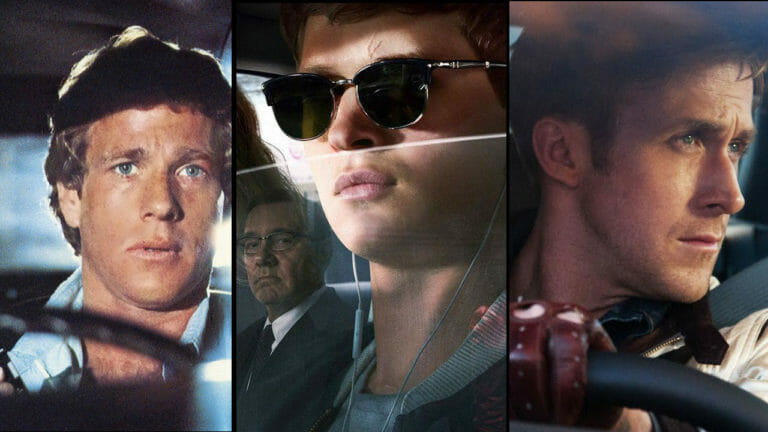By Valerie Kalfrin · July 3, 2017

The archetype of the morally ambiguous getaway driver driven to care about something besides crime gets a fresh spin in Baby Driver, a hugely entertaining caper that mixes comedy, drama, and character through action.
We’ve seen these cool, laconic guys before, notably in 1978’s The Driver with Ryan O’Neal and 2011’s Drive with Ryan Gosling, cruising through their stories on ennui until something – usually a woman – snags their attention, if not their conscience. Baby Driver has loads more joy. There’s an effervescence to the storytelling that throbs through the music in nearly every scene, the youth of the protagonist, the fishtailing plot twists, and the exhilarating driving sequences.
Writer-director Edgar Wright (Shaun of the Dead, Hot Fuzz, Scott Pilgrim vs. the World, The World’s End) knocked the film’s concept around for years, first using a music-loving getaway driver in a video for the British electronic duo Mint Royale. Despite the idea’s origin, the music in Baby Driver feels organic and in service to the story.
It’s tempting to use music as a shorthand for characterization or to comment on the action. But Wright invests us in a fully dimensional protagonist who telegraphs his personality largely through action and well-chosen words. He also just happens to have a hell of a playlist.
The film introduces Baby – the alias that the protagonist uses – in his element, wearing earbuds and sunglasses behind the wheel of a red Subaru sedan we never knew was so maneuverable. He’s fleeing the Atlanta cops after a heist in time to the Jon Spencer Blues Explosion’s “Bell Bottoms.” (Queen, Beck, Martha Reeves and the Vandellas, and R.E.M. also appear on the soundtrack.)
The crew recruited by Doc (Kevin Spacey) is impressed but doesn’t know what to think of this dude with the baby face and inscrutable stare. “He’s a good kid and a devil behind the wheel. What more do you need to know?” Doc says.
In a sense, he’s right. Baby is a character we’ve all seen before in a type of story that’s hardly on the cutting edge of originality (assuming you’ve seen the aforementioned Drive, and the The Driver). Fortunately, the devil is in the details, and Edgar Wright adds just enough personality to make the old feel new again. For aspiring screenwriters in particular, Baby Driver represents a prime example of how to transcend your influences without disregarding altogether. The script is unabashedly of a certain cinematic lineage, but a retread it most definitely is not.
Thanks to Wright and Ansel Elgort, who plays Baby, we learn plenty. Elgort, a lead in 2014’s teen-cancer romance The Fault in Our Stars and a supporting player in the Divergent series, often seemed aloof to me, even as he aimed to be charming. But that enigmatic quality works well here. Baby’s attitude reads as arrogant to some in Doc’s employ, like Griff (Jon Bernthal), and stupid to others like Bats (Jamie Foxx). Lovebirds Buddy (Jon Hamm) and Darling (Eiza González) seem too engrossed in each other to care.
Baby loves iPods – he has several – much like Star-Lord in the Guardians of the Galaxy series loves his Walkman and mix tapes for their connection to his mom and his childhood on Earth. The music ostensibly drowns out his tinnitus after a tragic car wreck, but that’s just an excuse for Baby to tune out everything until he finds something worth hearing.
With Doc and his cohorts, the sunglasses, jacket, and earbuds are like a uniform that shields Baby from this deadly business. He finds fun in driving, making it a game because he’s so good at it.
But when he’s at home with his foster father, Joseph (CJ Jones), Baby sheds the jacket, glasses, and earbuds, savoring the music he plays in the apartment by singing. Joseph, who uses a wheelchair and is deaf, knows where Baby gets the money hidden under the floorboards and tells Baby that he’s too good for that world. But Baby keeps moving, as if he’ll think too much if he stops.
Only when Debora (Lily James), a waitress singing in a sweet Southern lilt, sashays into the diner that Baby frequents is he content to be still. As she and Baby bond over music, Elgort and James (Downton Abbey, 2015’s live-action Cinderella) show an adorable chemistry. Their banter twinkles like the blinged-out iPod he brings to share a T. Rex song that bears her name.
“So, you’re feeling pink and sparkly today?” she asks.
“I am now,” he says.
He buys new vinyl, inspired by her. Joseph presses his hand to the speakers to feel the vibrations and grins. “Who’s the girl?” he signs.
It’s not all a lark, though. Doc took a shine to Baby when the youth was nervy enough to steal something from his Mercedes and holds tight to his lucky charm. Baby might have been an adrenaline junkie, but he’s really biding his time until Doc sets him free. Note how he takes the stairs after someone summons the elevator, how he steers in such a way to prevent someone from firing a gunshot. How he later grabs the front of a pistol, his insouciant reserve turning to firm resolve.
The mix of humor and violence is reminiscent of 1996’s Fargo, naturally springing from the situations and growing darker as the story progresses. Bats might have a hair trigger, but the rest of these crooks also can turn on one another in an instant, and the story never goes where we might expect. This kind of genre-mashup is just enough to revitalize the otherwise familiar archetypes, putting a new twist on a story we’ve seen before.
Like Doc said, Baby is a good kid and a high-octane driver. But once Baby glimpses the life he wants, it’s thrilling to watching him hustle to escape the one he has.